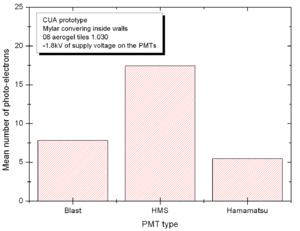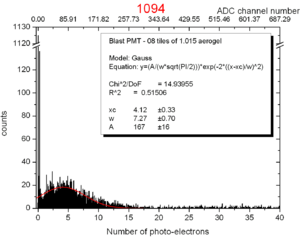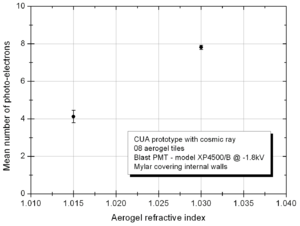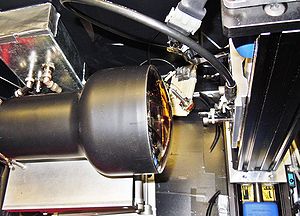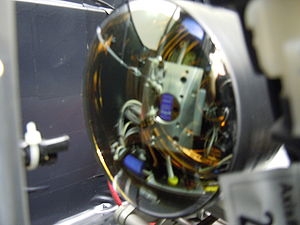Difference between revisions of "MainPage:Nuclear:KaonDetector:PMTCharacteristics"
| Line 58: | Line 58: | ||
| valign="top"| | | valign="top"| | ||
[[File:1094.png|thumb|center|300px|08 tiles of aerogel 1.015. Blast PMT model XP4500/B s/n 09650.]] | [[File:1094.png|thumb|center|300px|08 tiles of aerogel 1.015. Blast PMT model XP4500/B s/n 09650.]] | ||
| + | |} | ||
| + | |||
| + | {| border="0" style="text-align:center;" width="100%" | ||
| + | |+'''Summary of the aerogel evaluation - Aerogel Prototype''' | ||
| + | |- | ||
| + | | valign="top"| | ||
| + | [[File:1091_1094_summary.png|thumb|center|300px|Aerogel relative light yield evaluation using CUA Aerogel Detector prototype. 08 tiles of aerogel with Blast (XP4500/B) PMT.]] | ||
|} | |} | ||
Revision as of 15:54, 10 December 2012
| This page is under construction. |
| ⇐ Back to the Kaon Detector page |
Control and data acquisition
- Coda Logbook: Some details on the data acquisition are registered in the online logbook.
- COSMOS_Files:Page with the codes used in COSMOS to scan the PMTs
Kaon Aerogel Detector prototype - PMTs comparison
In order to compare the different PMT options we may have to install in the Kaon Aerogel Detector, a set of cosmic rays data was acquired with the CUA's prototype.
All the other configuration of the prototype were kept the same, just the PMT was exchanged between one test and the other. The setup was configured as follows:
- Cosmic ray configuration (two triggering PMTs with scintillator on the top and bottom of the prototype)
- 08 aerogel tiles with 1.030 refractive index
- Mylar covering the internal walls of the prototype
- High voltage of -1.80 kV on the PMT
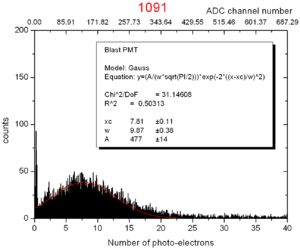 Blast PMT model XP4500/B s/n 09650. Calibration from run 481. 08 tiles of aerogel 1.030. |
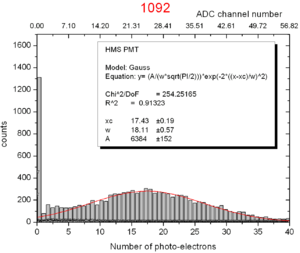 HMS PMT s/n 60158. Calibration from run 805. 08 tiles of aerogel 1.030. |
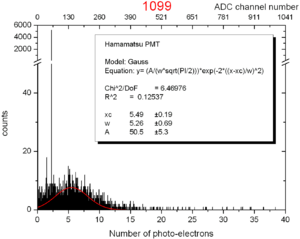 Hamamatsu PMT model R1250 s/n RA1815. Calibration from run 1096. 08 tiles of aerogel 1.030. |
To evaluate the relative light yield of the aerogel tiles with refractive indexes 1.030 and 1.015, the setup was run with the same configuration twice (just exchanging the aerogel).
The setup configuration was kept as follows:
- Cosmic ray configuration (two triggering PMTs with scintillator on the top and bottom of the prototype)
- 08 aerogel tiles
- Mylar covering the internal walls of the prototype
- High voltage of -1.80 kV on the PMT
- Blast PMT for all runs (model XP4500/B s/n 09650, with calibration from run 481)
PMTs at CUA
The group is performing different experiments with some PMT to construct a tool to analyse the equipment that will be used in the aerogel detector.
Since the Summer 2011, the Nuclear Physics group at CUA is performing tests on the following PMTs:
- PMT model XP4500B S/N 09641 (with electronic base #101)
- PMT model XP4500B S/N 09650 (with electronic base #102)
- PMT model XP4500B S/N 01414 (with electronic base #100)
- PMT model XP4500B S/N 09561 (with electronic base #102)
Previous analysis of PMT's gain
The University of South Carolina had analyzed the PMT before it comes to JLab. It was done in the summer of 2011. The plots with the main characteristics of each PMT, separated by its serial number, is shown in Gain Plots.
A table with these data can also be download as a spreadsheet: File:PMTcatalog.xls.
Position dependence of incident photon
Details on the step motor that are being used in the position dependence experiment can be found in the following links:
- Specification
- Drawing BiSlide 50
- Commands to program the hardware: File:StepMotorCommands.pdf
